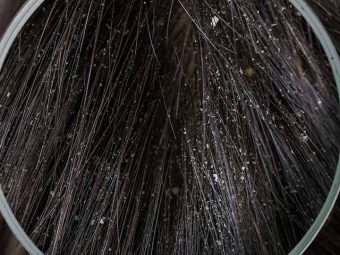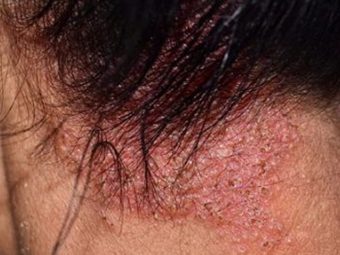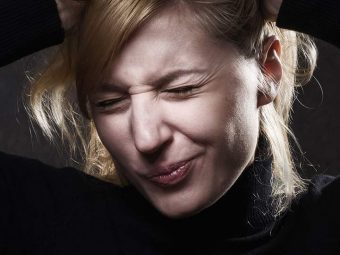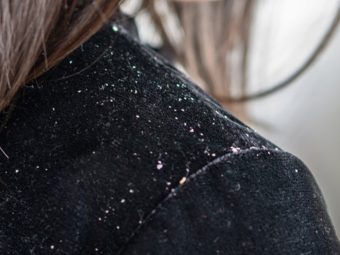Symptoms Of Dandruff, Its Types, Causes, And How To Treat It
Watch out for the signs of a fungal infection on the scalp so you can nip it in the bud.
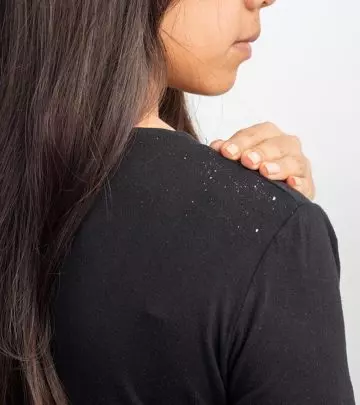
Image: Shutterstock
Most people realize they have dandruff only after noticing white flakes on their shoulders and clothes. But there are numerous symptoms of dandruff that most people do not know about, like an itchy scalp or hair fall. Knowing these symptoms can help you reduce dandruff right at the start. Read on to know about the causes and early signs of dandruff. Scroll down.
In This Article
Causes Of Dandruff
Dandruff can have a few common causes:
- Oily and irritated skin (may cause seborrheic dermatitis, a severe form of dandruff).
- Irregular shampooing causes dead skin cells to accumulate on the scalp. This may lead to flakes and itching.
- Malassezia, a yeast, may also cause dandruff (1).
- Certain personal care products containing chemicals can make the scalp red and itchy.
Dandruff is more common among men. Individuals with oily skin may also experience dandruff more frequently. People dealing with Parkinsons disease, epilepsy, or traumatic brain injury might also experience dandruff or seborrheic dermatitis (2).
Identifying the early symptoms of dandruff can help treat it more effectively. We have listed the most common dandruff symptoms in the following section.
Symptoms Of Dandruff
1. Itchy Scalp
An itchy scalp is the most common symptom of dandruff. The itching is caused due to loose visible flakes (the dead skin cells from the scalp). This symptom is more common in the winters. Dry scalp is the main cause of winter dandruff.
2. Hair Fall
Hair fall is a common symptom for most scalp problems, including dandruff. While losing 50 to 100 hair strands in a day is normal, anything beyond that can be a cause for concern. Such rapid hair fall could be a symptom of an unaddressed dandruff condition.
3. Dry/Dull Hair
Dandruff tends to extract existing scalp oils, leaving hair dry and dull.
4. Acne/Pimples
A sudden outbreak of pimples or acne could be another serious symptom of dandruff. Such outbreaks have a reddish appearance and could be painful too.
Dandruff can manifest in different types. Which of these are you experiencing?
Types Of Dandruff
1. Dry Skin Dandruff
This dandruff type is common in winters. Washing your scalp and hair with hot water may make your hair dry and flaky, causing dandruff. You may use moisturizing shampoos to treat this dandruff. Avoiding hair colors or chemical treatments can also help.
2. Oil-Related Dandruff
This dandruff type is caused due to the accumulation of excess sebum on the scalp. The sebum can clump the dead skin cells and cause itchy flakes. Stress and anxiety could contribute to this excess sebum production.
3. Fungal Dandruff
Fungal dandruff is caused by a fungus named Malassezia (1). This fungus feeds on the excess scalp sebum. It causes the skin cells to clump and leads to itchy flakes.
4. Disease-Related Dandruff
Ceratin skin conditions like eczema and psoriasis may cause excess production of skin cells. These skin cells, when in contact with sebum or dirt, may cause dandruff.
Identifying the type of dandruff you have is the first step in treating it. Combating dandruff, most often, is a matter of following certain simple methods.
How To Treat Dandruff?
1. Use An Anti-Dandruff Shampoo
Anti-dandruff shampoos are suitable for treating most types of dandruff. A mild shampoo is ideal, as it removes the itchy flakes without drying your scalp or hair out.
2. Use A Moisturizer
A dry scalp may cause itchiness and flakes. Hence, moisturizing your scalp can help. You can use virgin coconut oil for this purpose. The oil has antibacterial properties and helps fight dryness (3).
3. Maintain Proper Hygiene
Maintaining proper hygiene is important. Regular shampooing reduces excess scalp sebum. Also, limit the use of hair products as using too many of them can aggravate scalp itching. More importantly, resist the urge to scratch your scalp. Scratching can lead to scalp inflammation and worsen the condition.
4. Reduce Stress
Dandruff due to Malassezia fungus is more likely to occur with a compromised immune system (4). Stress is a major reason for weakened immunity (5). Reduce stress by practicing regular exercise/meditation. Taking a walk or listening to calming music can also help.
You may also talk to your doctor and opt for certain medications to treat dandruff.
What Medications Help Treat Dandruff?
- Zinc Pyrithione: Zinc pyrithione has antimicrobial, antifungal, and antibacterial properties. The medication helps treat dandruff by inhibiting the growth of the dandruff-causing yeast (1).
- Salicylic Acid: Salicylic acid helps reduce dandruff flakes and moisturizes the scalp. It is found in most over-the-counter shampoos (6).
- Selenium Sulfide: Selenium sulfide is an antifungal agent that helps treat dandruff (1).
Dandruff can be uncomfortable and irritating. However, dealing with it at an early stage reduces its ill effects on your hair. We hope this article has helped you understand the early dandruff symptoms and how you can treat them. Try the remedies listed and you will be happy with the results.
As they say, ‘prevention is better than cure,’ this article has introduced you to the many symptoms of dandruff to help you identify the issue and treat it right at the start. Follow the tips religiously to avoid dandruff and related hair issues. Also, adopt a healthy lifestyle as soon as possible. Drink plenty of water and give your scalp that much-needed hydration. Finally, our remedies mentioned above are always here to help you and surprise you with amazing results. So get ready to live a dandruff-free life!
Frequently Asked Questions
Is lemon good for dandruff?
Lemon juice has been recommended in several home remedies for treating dandruff. However, more research is needed to confirm the ingredient’s effectiveness.
Should I wash my hair every day if I have dandruff?
The amount of washing required to control dandruff differs from person to person. Some people need shampooing twice a week, while others require it more frequently, even daily. The best course of action is to seek medical advice.
Is onion good for dandruff?
Onion juice has been used for centuries to treat dandruff and hair loss. Studies have shown it to aid in eliminating Malassezia furfur, the fungus that causes dandruff (7).
Key Takeaways
- Excessive sebum production combined with scalp buildup and fungal infection may cause dandruff.
- Early signs of dandruff include a dry or itchy scalp, hair fall, sudden acne breakouts, and dry or dull hair.
- Reduce stress, maintain proper hygiene, and use anti-dandruff shampoos to treat dandruff.
References
Articles on StyleCraze are backed by verified information from peer-reviewed and academic research papers, reputed organizations, research institutions, and medical associations to ensure accuracy and relevance. Read our editorial policy to learn more.
- Revisiting dandruff,
https://onlinelibrary.wiley.com/doi/full/10.1111/j.1467-2494.2006.00326.x - Seborrheic Dermatitis and Dandruff: A Comprehensive Review,
https://www.ncbi.nlm.nih.gov/pmc/articles/PMC4852869/ - In vitro anti-inflammatory and skin protective properties of Virgin coconut oil,
https://www.sciencedirect.com/science/article/pii/S2225411017300871 - Malassezia-Associated Skin Diseases, the Use of Diagnostics and Treatment,
https://www.ncbi.nlm.nih.gov/pmc/articles/PMC7098993/ - Stress Damages Immune System and Health,
https://www.discoverymedicine.com/Ronald-Glaser/2009/07/18/stress-damages-immune-system-and-health/ - The antidandruff efficacy of a shampoo containing piroctone olamine and salicylic acid in comparison to that of a zinc pyrithione shampoo.,
https://europepmc.org/article/med/18503415 - In vitro antifungal activities of Allium cepa, Allium sativum and ketoconazole against some pathogenic yeasts and dermatophytes
https://pubmed.ncbi.nlm.nih.gov/16690223/




